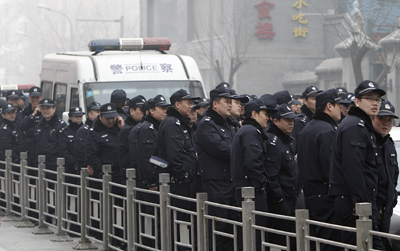Fearing Egypt-style revolt, Cameroon bars Twitter service
“For security reasons, the government of Cameroon requests the suspension of the Twitter sms integration on the network,” announced a March 8 tweet by Bouba Kaélé, marketing manager of the Cameroon unit of South Africa-based telecommunications provider MTN. The announcement has since disappeared from Kaélé’s Twitter feed, but was memorialized by a handful of Twitter…

Michael Anti’s exile from Facebook over ‘real-name policy’
The Chinese journalist Michael Anti had his Facebook account deleted in January. The reason Facebook gave was that Michael Anti isn’t his real, government-recorded, name–which is true. Instead, Anti is the name that he has written under for almost a decade, on his own personal blogs, and in his writing for the New York Times…
CPJ calls on China to stop inhibiting international press
New York, March 7, 2011–The Committee to Protect Journalists rejects statements by a Chinese government official that international reporters are not being detained, attacked, and harassed in China. CPJ calls on the police to end their anti-media attempts to stop foreign journalists from reporting on possible anti-government demonstrations in what has become known as the…

Abusive Twitter messages target foreign media in China
California-based China Digital Times (CDT) reports new Chinese-language Twitter commentators have appeared in the last week. Twitter is generally blocked in China, but heavily used by activists who access it by means of proxy networks overseas. The recent arrivals are vocal supporters of the government’s efforts to tamp down nascent “Jasmine Revolution” rallies anonymously organized…

Yemeni Journalists Syndicate stormed; Baghdad apologizes
New York, February 28, 2011–The Committee to Protect Journalists is alarmed by the ongoing attempts of governments in the Middle East to censor news coverage of protests. In Yemen, men stormed the Journalists’ Syndicate on Saturday, and in Iraq, journalists demanded apologies from the military after a crackdown on the press on Friday, and Baghdad…
China detains, censors bloggers on ‘Jasmine Revolution’
New York, February 25, 2011–China’s censors tightened Internet controls and security officials harassed and detained writers and activists in the wake of an online appeal for a “Jasmine Revolution” in China, according to international human rights groups and news reports. The apparent crackdown came in advance of two top legislative meetings, the National People’s Congress…

Libya: foreign reporters ‘outlaws’; Mideast attacks continue
New York, February 23, 2011–The Committee to Protect Journalists is concerned about the ongoing attack on journalists and bloggers in the Middle East. Today the Libyan deputy foreign minister warned foreign journalists crossing the eastern border that they will be treated as “outlaws,” according to news reports. In Iraq, gunmen raided the office of a…

Cambodia orders popular blog blocked
Bangkok, February 23, 2011–The Committee to Protect Journalists is concerned by reports that Cambodian authorities have ordered local Internet service providers to block a number of websites, including the popular KI Media news aggregator and commentary blog, considered critical of the government.

Reporter missing in Libya; attacks continue in Yemen, Iraq
New York, February 22, 2011–The Committee to Protect Journalists is alarmed by the ongoing deterioration of conditions for the media in the Middle East, including the disappearance of Atef al-Atrash, a critical Libyan journalist, since anti-Qaddafi demonstrations began February 17. The Internet has been intermittently down since Saturday in the country, according to international news…
Libya’s disordered Internet
Craig Labowitz at Arbor has been sifting through the evidence of how countries in the Middle East have been blocking and throttling the Internet in the last week. His analysis indicates that while both Bahrain and Yemen had periods of slowed or impaired access, only Libya seems to have taken the drastic step of shutting off the…